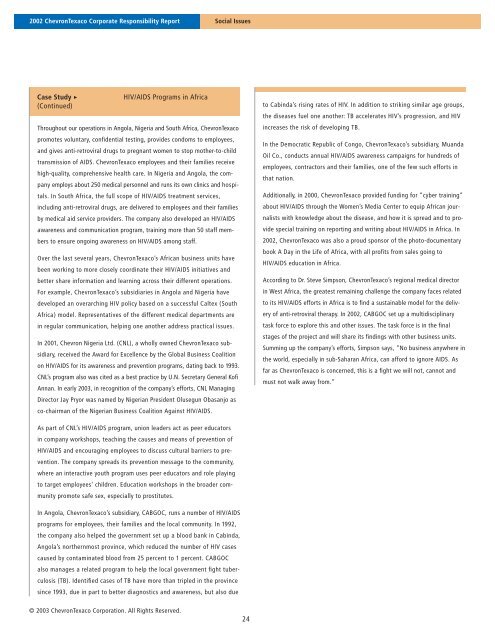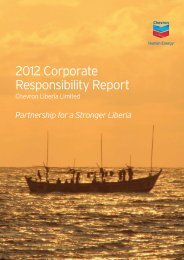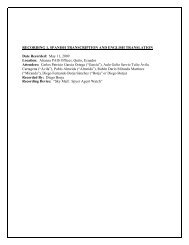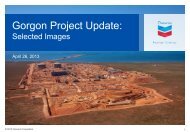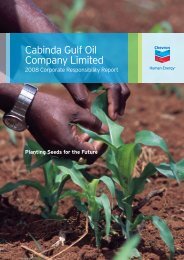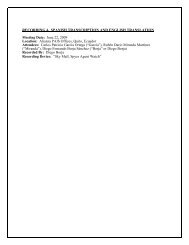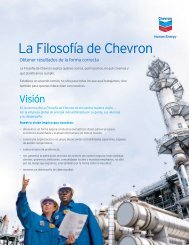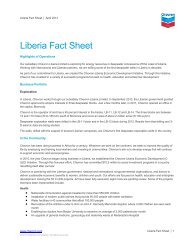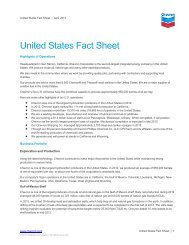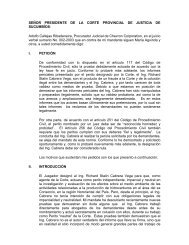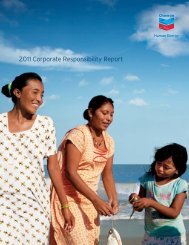Download PDF - Chevron
Download PDF - Chevron
Download PDF - Chevron
Create successful ePaper yourself
Turn your PDF publications into a flip-book with our unique Google optimized e-Paper software.
2002 <strong>Chevron</strong>Texaco Corporate Responsibility Report Social IssuesCase Study >HIV/AIDS Programs in Africa(Continued)Throughout our operations in Angola, Nigeria and South Africa, <strong>Chevron</strong>Texacopromotes voluntary, confidential testing, provides condoms to employees,and gives anti-retroviral drugs to pregnant women to stop mother-to-childtransmission of AIDS. <strong>Chevron</strong>Texaco employees and their families receivehigh-quality, comprehensive health care. In Nigeria and Angola, the companyemploys about 250 medical personnel and runs its own clinics and hospitals.In South Africa, the full scope of HIV/AIDS treatment services,including anti-retroviral drugs, are delivered to employees and their familiesby medical aid service providers. The company also developed an HIV/AIDSawareness and communication program, training more than 50 staff membersto ensure ongoing awareness on HIV/AIDS among staff.Over the last several years, <strong>Chevron</strong>Texaco’s African business units havebeen working to more closely coordinate their HIV/AIDS initiatives andbetter share information and learning across their different operations.For example, <strong>Chevron</strong>Texaco’s subsidiaries in Angola and Nigeria havedeveloped an overarching HIV policy based on a successful Caltex (SouthAfrica) model. Representatives of the different medical departments arein regular communication, helping one another address practical issues.In 2001, <strong>Chevron</strong> Nigeria Ltd. (CNL), a wholly owned <strong>Chevron</strong>Texaco subsidiary,received the Award for Excellence by the Global Business Coalitionon HIV/AIDS for its awareness and prevention programs, dating back to 1993.CNL’s program also was cited as a best practice by U.N. Secretary General KofiAnnan. In early 2003, in recognition of the company’s efforts, CNL ManagingDirector Jay Pryor was named by Nigerian President Olusegun Obasanjo asco-chairman of the Nigerian Business Coalition Against HIV/AIDS.to Cabinda’s rising rates of HIV. In addition to striking similar age groups,the diseases fuel one another: TB accelerates HIV’s progression, and HIVincreases the risk of developing TB.In the Democratic Republic of Congo, <strong>Chevron</strong>Texaco’s subsidiary, MuandaOil Co., conducts annual HIV/AIDS awareness campaigns for hundreds ofemployees, contractors and their families, one of the few such efforts inthat nation.Additionally, in 2000, <strong>Chevron</strong>Texaco provided funding for “cyber training”about HIV/AIDS through the Women’s Media Center to equip African journalistswith knowledge about the disease, and how it is spread and to providespecial training on reporting and writing about HIV/AIDS in Africa. In2002, <strong>Chevron</strong>Texaco was also a proud sponsor of the photo-documentarybook A Day in the Life of Africa, with all profits from sales going toHIV/AIDS education in Africa.According to Dr. Steve Simpson, <strong>Chevron</strong>Texaco’s regional medical directorin West Africa, the greatest remaining challenge the company faces relatedto its HIV/AIDS efforts in Africa is to find a sustainable model for the deliveryof anti-retroviral therapy. In 2002, CABGOC set up a multidisciplinarytask force to explore this and other issues. The task force is in the finalstages of the project and will share its findings with other business units.Summing up the company’s efforts, Simpson says, “No business anywhere inthe world, especially in sub-Saharan Africa, can afford to ignore AIDS. Asfar as <strong>Chevron</strong>Texaco is concerned, this is a fight we will not, cannot andmust not walk away from.”As part of CNL’s HIV/AIDS program, union leaders act as peer educatorsin company workshops, teaching the causes and means of prevention ofHIV/AIDS and encouraging employees to discuss cultural barriers to prevention.The company spreads its prevention message to the community,where an interactive youth program uses peer educators and role playingto target employees’ children. Education workshops in the broader communitypromote safe sex, especially to prostitutes.In Angola, <strong>Chevron</strong>Texaco’s subsidiary, CABGOC, runs a number of HIV/AIDSprograms for employees, their families and the local community. In 1992,the company also helped the government set up a blood bank in Cabinda,Angola’s northernmost province, which reduced the number of HIV casescaused by contaminated blood from 25 percent to 1 percent. CABGOCalso manages a related program to help the local government fight tuberculosis(TB). Identified cases of TB have more than tripled in the provincesince 1993, due in part to better diagnostics and awareness, but also due© 2003 <strong>Chevron</strong>Texaco Corporation. All Rights Reserved.24


